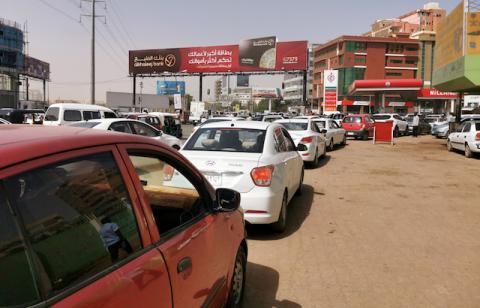Advertisement
Fuel shortages put squeeze on Sudan's transitional government
KHARTOUM (Reuters) - Fuel shortages have left motorists in Sudan skipping work to queue for petrol and forced the transitional government to introduce a rationing system as it tries to manage acute economic pressures.
Some people have been spending entire days in queues that stretch for several km (miles) since the fuel crisis began late last week. Coming on top of bread shortages it has piled more pressure on a government struggling to deliver improvements after the overthrow of former President Omar al-Bashir last April.
"I go from the bread queue to the petrol queue and from the petrol queue to the gas queue," said Ali Abdallah, waiting with his motorbike outside a petrol station in the centre of the capital, Khartoum. "Our lives are spent going from one queue to the other."
The government is working under a three-year power sharing deal between the military and civilians and is battling with the legacy of decades of economic sanctions and mismanagement that hampered infrastructure development and investment.
It also inherited a generous subsidy system under which petrol costs just 6.17 Sudanese pounds per litre (about 12 U.S. cents at official rates, or 6 cents at black market rates) and diesel 4.14 pounds per litre.
Officials have talked about moving towards cash transfers, but still have to negotiate a plan for subsidy reform and overcome technical challenges to administer the payments.
They say the current problem is caused by a broken refinery pipeline that they are working to fix, though it is unclear how long this will take. Imports and distribution of fuel have been restricted by foreign currency shortages and a lack of road transport and port capacity.
BLACK MARKET
The shortage has given rise to a black market, and officials announced on Monday that fuel would be rationed at four gallons per vehicle for two days.
"Supplies are continuing, there is no need to panic," Energy Minister Adel Ibrahim told reporters.
Though there have been occasional fuel shortages before and after last year's uprising, some motorists say the current one is the worst yet.
Taxis are hard to find and drivers have sharply raised their prices to compensate for the time they spend queuing for fuel.
At the Khartoum petrol station the queue snaked for at least a kilometre onto a side road, passing a bakery where a small crowd was queuing for bread.
Another queue for diesel cut through some residential blocks whilst closer to the pumps, motorbikes and motorised rickshaws fanned out in separate lines.
Some drivers pushed cars that had run out of fuel.
"The government needs to find a solution," said computer engineer Moussa Ali Moussa, who had come from Khartoum's twin city Omdurman to search for fuel. "A car can't run without petrol, right?"
(Additional reporting by Samar Hassan in Cairo; Writing by Aidan Lewis, Editing by William Maclean)



















Add new comment